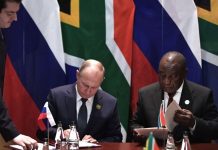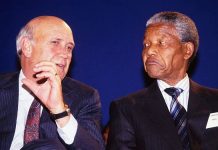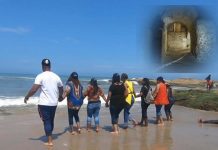Trump Recognized Morocco’s Illegal Occupation to Boost the Israeli Occupation
On December 10, the United States became the only major country to formally recognize Morocco’s illegal annexation of Western Sahara, the former Spanish colony forcibly seized by Moroccan forces in 1975. Trump’s proclamation is directly counter to a series of UN Security Council resolutions and a landmark World Court ruling calling for self-determination.
Trump’s decision was a quid pro quo: a reward for Morocco’s formal recognition of Israel, a country which is also an occupying power. Trump had previously broken precedent by recognizing Israel’s illegal annexation of Syria’s Golan Heights and greater Jerusalem. The U.S. recognition of the annexation of an entire country, which has been recognized as an independent state by no less than 80 countries, is a particularly dangerous precedent. As with his earlier recognition of Israel’s conquests, Trump is effectively renouncing longstanding international legal principles in favor of the right of conquest.
And, since Western Sahara is a full member state of the African Union, Trump is essentially endorsing the conquest of one recognized African state by another. It was the prohibition of such territorial conquests enshrined in the UN Charter which the United States insisted had to be upheld by launching the Gulf War in 1991, reversing Iraq’s conquest of Kuwait. Now, the United States is essentially saying that an Arab country invading and annexing its small southern neighbor is OK after all.
Trump cites Morocco’s “autonomy plan” for the territory as “serious, credible, and realistic” and “the ONLY basis for a just and lasting solution” even though it falls far short of the international legal definition of “autonomy” and in effect would simply continue the occupation. Human Rights Watch, Amnesty International and other human right groups have documented the Moroccan occupation forces’ widespread suppression of peaceful advocates of independence, raising serious questions about what “autonomy” under the kingdom would actually look like.

Login or Register at www.kwyknote.com
Western Sahara is a sparsely populated territory about the size of Colorado, located on the Atlantic coast in northwestern Africa just south of Morocco. Traditionally inhabited by nomadic Arab tribes, collectively known as Sahrawis, and famous for their long history of resistance to outside domination, their dialect, dress and customs are distinct from most Moroccans. Spain occupied the territory beginning in the late 1800s and maintained its rule until the mid-1970s, well over a decade after most African countries had achieved their freedom from European colonialism.
In 1973, the nationalist Polisario Front launched an armed independence struggle against Spain and Madrid eventually promised the people of what was then still known as the Spanish Sahara a referendum on the fate of the territory by the end of 1975. Irredentist claims by Morocco and Mauritania were brought before the International Court of Justice, which ruled in October of 1975 that — despite pledges of fealty to the Moroccan sultan back in the 19th century by some tribal leaders bordering the territory and close ethnic ties between some Sahrawi and Mauritanian tribes — the right of self-determination was paramount. A special Visiting Mission from the United Nations engaged in an investigation on the situation in the territory that same year and reported that the vast majority of Sahrawis supported independence under the leadership of the Polisario, not integration with Morocco or Mauritania.
During this same period, Morocco was threatening war with Spain over the territory. Though the Spaniards had a much stronger military, they were at that time dealing with the terminal illness of their longtime dictator Generalissimo Francisco Franco as well as increasing pressure from the United States, which wanted to back its Moroccan ally King Hassan II and did not want to see the leftist Polisario come to power. As a result, despite its earlier pledge to hold a referendum with the assumption that power would soon thereafter be handed over to the Polisario, Spain instead agreed in November 1975 to grant administrative control of the territory to Morocco (and, for a time, Mauritania) pending an act of self-determination. It never happened, however.![]()
SOURCE ⇒ TRUTHOUT
Consider supporting AMIBC™. Contribute by clicking on the advertisers and sponsors featured on AMIBC™ and please utilize them. Readers from around the world, like you, make our work possible. We need your support to deliver quality, vetted, investigative journalism – and to keep it open for everyone. At a time when factual, honest reporting is critical, your support is essential in protecting our editorial independence. The narratives and issues impacting all Americans is tantamount to the AMIBC™ platform. Every contribution, however big or small, is valuable for our future. Make sure to join the AMIBC Founders Club to maximize the total advantage of being a subscriber.




































